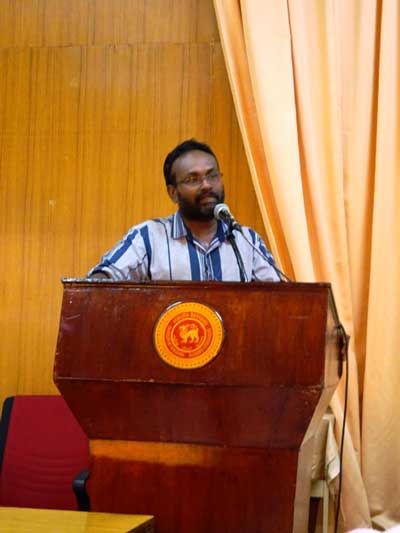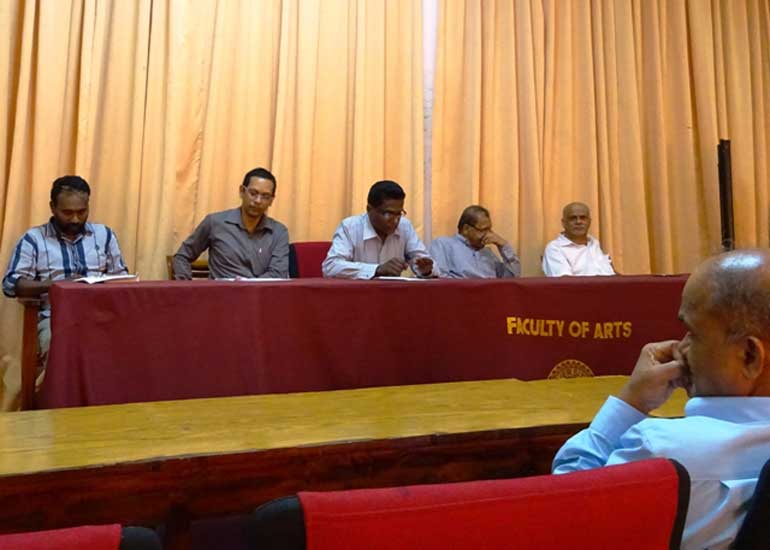Wednesday Feb 25, 2026
Wednesday Feb 25, 2026
Saturday, 6 June 2015 00:00 - - {{hitsCtrl.values.hits}}

Book reviewed by University of Peradeniya Sinhala Department Senior Lecturer Dr. Amarakeerthi Liyanage

From left: University of Peradeniya Sinhala Department Senior Lecturer Dr. Amarakeerthi Liyanage; Faculty of Arts Acting Dean Dr. Danesh Karunanayake, Dr. Ananda Jayawickrema, Prof. Sisira Pinnawala, University of Peradeniya and Pathfinder Foundation Executive Director Luxman Siriwardena
The University of Peradeniya, a longstanding bedrock of academic discourses in many aspects of Sri Lanka’s development process, was the location chosen by the Center for Social Science Studies for the launch of the timely publication of ‘Identity Politics and State – Building in Sri Lanka’ edited by Dr. Sisira Pinnawala, Professor of Sociology.
This volume has been the outcome of a project titled ‘Historical Memory as a Tool for Conflict Resolution’ commissioned by the Pathfinder Foundation and the Institute for the Study of Human Rights of Columbia University.
The objective of this series of studies was engaging scholarly and intellectual participation in the country’s post-conflict peace building and reconciliation effort.
The participants at the book launch included senior academics from Peradeniya University as well as some students keen to learn about history, politics, economics and conflict resolution in a broader context of peace and reconciliation.
The volume, consisting of seven chapters written by seven scholars, was reviewed by Dr. Amarakeerthi Liyanage, Senior Lecturer from the Sinhala Department of the University of Peradeniya. The main thrust of his analysis was that subjects under discussion were highly relevant in the current context of Sri Lanka’s post-conflict need for formulating programs for ethno-religious reconciliation.
The volume provides revealing historical insights into the dynamics of collective identity formation and nation building in Sri Lanka. In doing so, it highlights the considerable shared history among all the communities which inhabit this island.
The three thematic focus areas for the studies were:
The nature of the pre-colonial state focusing on state and collective identity formation.
Identity and political mobilisation in the colonial Sri Lanka
Postcolonial State and nation building in Sri Lanka since 1948: Approaches, Attempts and Challenges.
Contributors to this volume are well-known Sri Lankan academics:
Prof. P.V.B. Karunatilaka – Pre-colonial State and Collective Identities.
Dr. Janaki Jayawardena – Identity and Political Mobilisation in the Colonial Sri Lanka.
Prof. Gamini Keerawella – Postcolonial State – Building in Sri Lanka since 1948: Approaches, Attempts and Challenges.
Prof. Sisira Pinnawala and Prof. S. Sathiaseelan – Evolution of Postcolonial Institutions of Power and Governance and the issue of Political Representation of Minorities.
Dr. S. A.C. Feroziya – The Muslims and the Postcolonial State – Building in Sri Lanka.
Dr. O.G. Dayaratne – Banda – Identification of Ethnicity with Economic Functions of the Postcolonial State in Sri Lanka.
The book launch was presided over by Dr. Danesh Karunanayake, Acting Dean of the Faculty of Arts. Other participants included Prof. Anura Wickremasinghe, Dean Faculty of Science, Prof. H.M.D.R. Herath, Head of Sociology, Rev. Prof. Hanguranketha Dheerananda, Director of the Postgraduate Institute of Social Sciences and Humanities, Dr. Ananda Jayawickrema, Dr. O.G. Dayaratne-Banda from the Department of Economics and Dr. Jeewaka Saman Kumara from the Department of Political Science.